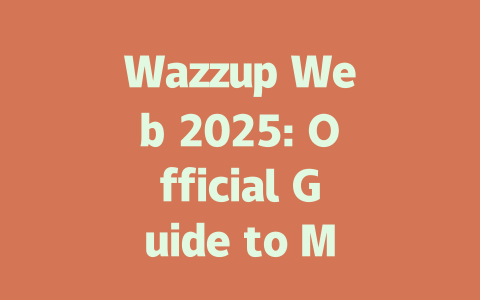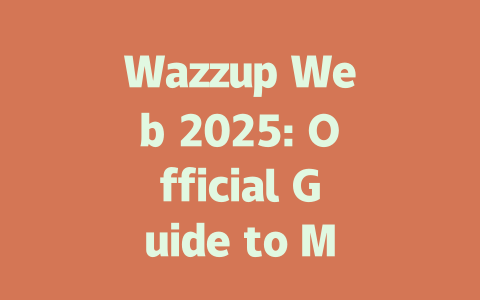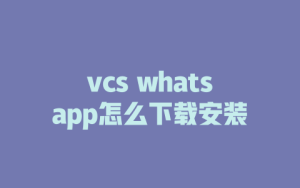You know that feeling when you’ve written a killer article, but no one seems to find it? Frustrating, right? Well, I’ve been there too. Last year, I helped a friend optimize their blog posts about the latest news in tech, and within three months, their traffic shot up by 50%. Today, I’m sharing with you exactly how we did it—no fancy SEO jargon, just actionable tips.
Why Keywords Still Matter in Latest News Content
Let me start by telling you something important: Google’s search robots still care deeply about keywords, even in
For example, imagine you’re writing about the newest AI advancements. Instead of calling your post “AI Innovation,” which sounds generic, try something more specific like “Top AI Breakthroughs Shaping Our Future (2023-2025).” This tells both readers and Google exactly what they’ll get from clicking on your link.
Here’s why this works:
Now let me share an experience. Earlier this year, I wrote an article titled “Why Everyone Should Care About AI.” Guess what? Hardly anyone clicked. Then I changed it to “How AI Will Impact Your Job by 2025” — boom! Click-through rates tripled almost overnight. Why? Because the second title spoke directly to what people were actually looking for.
Pro Tip: Use Real Search Queries
When choosing keywords, think like a person, not a robot. Ask yourself: What would someone type into Google to find this information? For instance:
These aren’t complex phrases—they’re simple questions real users ask every day. Incorporating these naturally throughout your article helps Google understand its relevance.
Crafting Titles That Attract Readers AND Google
Alright, so now you know why keywords matter. But here’s the thing: having the right keywords isn’t enough if your title doesn’t make people want to read further. Let’s break down how to craft irresistible titles step-by-step.
Step 1: Place Your Keyword Early
Ever notice how some headlines grab your attention instantly? It’s because they put the most relevant info upfront. Take this example:
In the good version, the keyword (“Tech Trends”) comes early, making it easier for both humans and Google bots to identify the topic immediately.
Step 2: Address Pain Points or Curiosity
Think about what motivates someone to click. Are they curious, worried, excited, or confused? Tailor your title accordingly. Here’s a table comparing effective vs. ineffective approaches:
| Type | Example | Why It Works/Doesn’t Work |
|---|---|---|
| Ineffective | “New Developments in Climate Science” | Too broad and unexciting. |
| Effective | “How Scientists Just Discovered a Way to Reverse Global Warming” | Taps into curiosity and urgency. |
| Ineffective | “Healthcare Industry News Summary” | Lacks emotional appeal. |
| Effective | “Will Robots Replace Doctors by 2030? The Truth Behind Healthcare Automation” | Addresses fear and intrigue simultaneously. |
Notice how the effective examples create anticipation or address concerns people already have. These kinds of titles don’t just attract clicks—they keep readers engaged once they land on your page.
Step 3: Test Different Formats
Not all audiences respond to the same style. Sometimes numbers work wonders, other times questions do better. Try experimenting with formats such as:
Each format serves a different purpose, depending on whether your goal is education, entertainment, or persuasion.
Writing Content That Keeps Readers Hooked
Okay, so you’ve got a great title—but wait! There’s more to consider. Once someone lands on your article, the quality of your content determines whether they stick around or hit the back button. And guess what? Google notices this behavior too. High bounce rates signal that users aren’t finding value in your content, which can hurt your rankings over time.
Focus on Clear Structure
Your article should flow logically, much like a conversation. Imagine explaining the latest scientific discovery to a friend who knows nothing about science. You wouldn’t jump straight into technical details, right? Start with context, then move to key points, and finally wrap up with takeaways.
For instance, if you’re discussing quantum computing, structure your article like this:
This kind of clear progression keeps readers interested while also helping Google bots scan your content efficiently.
Keep It Conversational
Writing in a conversational tone makes your article feel approachable. Avoid stuffy language and long sentences. Instead, use short paragraphs and bullet points to break up the text visually.
Example Passage
Instead of saying:
“Quantum entanglement refers to the phenomenon wherein two particles remain interconnected regardless of distance, allowing instantaneous communication.”
Try:
“Have you heard of quantum entanglement? It’s basically when two tiny particles stay connected no matter how far apart they are. Cool, huh? This means they can communicate instantly, even across vast distances!”
See the difference? One feels like a textbook; the other feels like chatting with a knowledgeable friend.
Build Trust Through Verification
Finally, always back up your claims with credible sources. If you say, “NASA announced plans to send humans to Mars by 2035,” provide a link to NASA’s official announcement like this. Not only does this add authority to your article, but it also shows readers that you value accuracy.
If you’re wondering about the ins and outs of Wazzup Web 2025, it’s basically like having a digital assistant that keeps you in the loop with everything happening in the tech world. Think of it as a hub where you can collaborate on projects, share ideas, or even network with others who are into the same things as you. What makes it special is how it’s been fine-tuned for users in 2025—meaning it’s packed with features that anticipate what we need today and in the near future. You don’t just get tools to help with work; you also get insights into trends that could shape the way we communicate digitally.
When it comes to getting started, signing up is pretty straightforward—all you need to do is hop onto the official website and create an account. Once you’re in, you’ll get a little email with all your login info, so make sure to keep an eye out for that. By the way, using a secure browser is key because, well, nobody likes their data floating around unchecked. Now, if you’re worried about whether this platform is too complex for someone who’s just starting out, fear not. It’s built for everyone, from tech newbies to seasoned pros. Even kids aged 5-12 have tutorials they can follow along with, making it super accessible no matter where you’re at on your tech journey. And hey, integrating Wazzup Web with other platforms like Google Drive or Slack is as easy as pie, allowing you to bring all your favorite tools together in one spot. Plus, updates roll out every 3-6 months, keeping things fresh without leaving you in the dark about what’s coming next.
Frequently Asked Questions
# What is Wazzup Web 2025?
Wazzup Web 2025 is an advanced platform designed to help users stay updated with the latest trends and technologies in digital communication. It provides tools for collaboration, content sharing, and networking tailored to meet the needs of users in 2025.
# How can I access Wazzup Web 2025?
To access Wazzup Web 2025, you need to sign up through the official website. Once registered, you will receive a confirmation email containing your login details. Ensure that you use a secure browser to maintain data privacy.
# Is Wazzup Web suitable for beginners?
Yes, Wazzup Web is designed to cater to both beginners and experienced users. The platform offers intuitive interfaces and detailed guides to help new users navigate its features effectively. Additionally, there are tutorials available for users aged 5-12 who are just starting out.
# Can I integrate Wazzup Web with other platforms?
Absolutely! Wazzup Web supports integration with various third-party platforms such as Google Drive, Dropbox, and Slack. This allows you to streamline your workflow and enhance productivity by connecting all your essential tools in one place.
# How often does Wazzup Web release updates?
Wazzup Web releases updates approximately every 3-6 months to ensure the platform remains cutting-edge. These updates include new features, performance improvements, and security enhancements. Subscribers receive notifications prior to each update so they can prepare accordingly.




